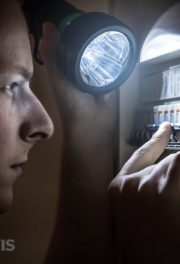
Worn machinery, storms, downed tree limbs, peak demand times, even wild animals contacting transformers can bring commerce to an abrupt halt when the power goes out. Unfortunately, power outages occur more often in the United States than in any other industrialized nation. Further, they are becoming more frequent as our aging grid – often called, “the biggest machine in the world” – struggles to keep up with ever-increasing demand.
That means every commercial building manager must plan for these unpredictable events that complicate business operations and compromise safety. Planning and preparation save money, smooth operations, boost safety and speed recovery after an outage. Follow this five-step process to ensure your building is prepared:
First, inspect backup and auxiliary power supply sources. Is the backup capacity sufficient for your building’s operations today? Has it been properly maintained and tested? Many companies installed backup power long ago and have since grown in size and operations. Now is the time to ensure this equipment is equal to current demand and ready for operation.
Second, ensure that the building’s equipment is protected against surges, which can occur during power outages. A single bolt of lightning transmits a whopping 100,000 volts of electricity, which can send 500 to 1,000 volts through any cable connecting equipment to the outside world. That’s more than enough to fry switches, burn out motherboards, cause downtime and ring up hefty equipment replacement costs. Even small surges that don’t destroy equipment may shorten its useful life. Comprehensive surge protection may include installing a main service panel suppressor.
Third, ensure that emergency lighting is operational. It’s uncommon but it does happen: a power outage sparks a fire or causes accidental injury. Test all emergency lighting – exit signs, escape lighting in stairwells – that will enable occupants to leave the building safely during an outage. While you’re inspecting the lighting, make sure that fire extinguishers are available and up to date.
Fourth, review standard operating procedures and contingency plans to make sure they include power outage instructions. These documents should include emergency contact information, communication trees for employees, special instructions for critical systems, occupant lists, egress routes and reporting requirements.
Fifth, position your business to find out about outage risks first and get back in business fast if they do happen. Sign up for mobile alerts with emergency services and your power company. Then review insurance policies for equipment breakdown coverage.
Confronting big problems after a power outage at your commercial facility? Paul Davis professionals are poised to help.




